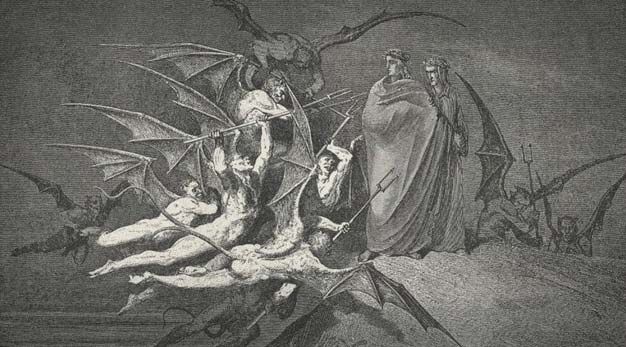 A friend of mine borrowed my copy of the first part of Dante Alighieri’s triptych, the Divine Comedy. This sparked an interesting discussion of heaven and hell.
A friend of mine borrowed my copy of the first part of Dante Alighieri’s triptych, the Divine Comedy. This sparked an interesting discussion of heaven and hell.
Thinking about it forced me to confront what I really believe about the hereafter, in the context of my faith and Church teaching, so I thought I’d share it with you.
Now, this post isn’t intended to be a theological dissertation, just my musing aloud. If I say something that offends, please write it off as my honest attempt to communicate what is in my heart in 600 words or less.
At every Mass, the faithful recite a “profession of faith,” which in most cases is the Nicene Creed, the seminal statement of the Christian faith proceeding from the first ecumenical council convened in the fourth century. In it, we proclaim, “He (Jesus Christ) will come again in glory to judge the living and the dead, and His kingdom will have no end.”
This speaks of the great, last judgment. But what about my own particular judgment? It may be that I will die before Christ’s return. I will meet Him face to face. What will He say to me? Where will I spend eternity?
That’s THE question isn’t it? The bottom line of life is what will eternity be for me?
In the first part of Dante’s epic poem, Inferno, the Pilgrim gets a tour of hell. There are nine levels, or circles, each with its own torments, which are in keeping with the gravity of the individual’s sins. There he meets many people, some of whom he knew in life. The lowest level is reserved for Satan and Judas. Beyond the poetic imagery, this view of hell is very attractive to the western mind, which seeks rationality and order in all things. We must know the whys and wherefores of everything. We are uncomfortable with mystery.
So, as youngsters we were taught that good actions merit heaven, and bad actions merit hell. Fear of hell is instilled in us to keep us on the straight and narrow. It is a place where God will torture bad people. This view is utterly at odds with God’s nature as infinite love and mercy. Furthermore, this is the thinking of a slave! I must do as the master says if I want to avoid being beaten. I hate the master for holding this power over me, but I fear the pain more.
It shouldn’t shock you to know that I personally detest this view of God. Let me go a step further—and get myself excommunicated—by saying I detest the idea of Purgatory, or toll-houses, or anything that smacks of it…in the literal sense.
I believe life on this earth is itself our place of purgation. It is God’s intention that we daily repent of our sins, and conform ourselves to the image of Christ. This is a long, painful process based in the exercise of faith and good will toward God, because eternity doesn’t begin the day we die, it begins this very minute! In fact, this minute is all that’s real anyway. Yesterday is gone, tomorrow may never come (on this planet anyway). We have only now. If today you hear His voice, harden not your heart!
When I boil it all down, I believe that Heaven isn’t so much a place as it is an ongoing, loving relationship with the all-good, all-merciful Creator. And since there is no place God does not inhabit, there can be no hell where I am free from Him. In Psalm 139, David wrote, “Where can I go from your Spirit? Where can I flee from your presence?” Hell is the eternally, painful experience of living in the light of God’s goodness and love; the goodness and love I have rejected by my own pride and foolishness.
I explained this to my friend in this way: imagine being forced to spend all eternity in a room with someone you despise, whose very presence reminds you of your own folly, bitterness, and hate, and knowing that person will never leave.
God doesn’t torture “bad” people when they die. I believe “bad” people will experience the love of God as a burning fire. An excruciating reminder of the birthright they surrendered for their little bowl of porridge. On that dreadful Last Day, I believe that Christ will speak what is in our own hearts. He will either say, “Rob, you never loved me. You never wanted me. And you still don’t want Me. Now live in the knowledge of what you’ve thrown away.”
Or, what I hope He’ll say, “Well done good and faithful servant! Come and share your Master’s happiness!”
This is my profession of faith.

I agree with this analogy Rob….. Great stuff……
Hmmmm……I think you either need to think harder……or less hard. I’m not sure which? I need to think about it.